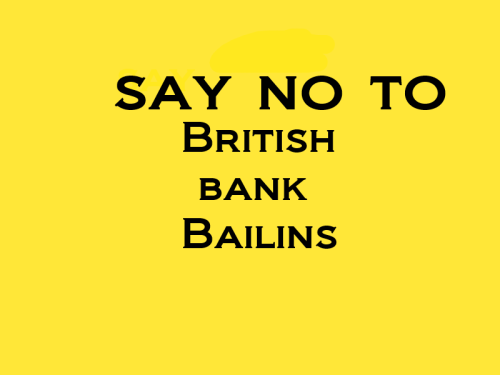Basically it states that bank customers are no longer customers but creditors. This means that your money is not your money, it belongs to the bank and you are allowed some of it to live on. In the event of a bank collapse, you will be allowed to withdraw only a small amount.
If a global banking collapse is generated (wilfully?), banks could then issue a highly devalued currency and tax all cash payments. Getting your money out of the bank in this case would be pointless because it would be worthless. What everyone should be worrying about now is what to do with their savings, and if you thought you wouldn't be affected because you have less than €100,000, think again, because you'll have to pay a penalty tax.
There should have been uproar at this scandal, but it was passed in quasi-silence by the media. Our politicians are merely puppets of the EU and can do nothing without being on the sharp end of a tug on the short and curlies.
I don't know where you can put your money. I have no idea what to do with my meagre savings which I thought were safely tucked away in assurance-vie and some other scheme. The only thing that comes to mind is to spend the lot and be damned. Spend it while you can, while it's still worth something.
 |
| AND FRENCH |
Follow-up here: Imminent bank collapse
In short, thinking that the bailin template is a hastily flung together and somewhat academic exercise is fine if you want to lose the shirt off your back. Otherwise, withdraw such money as you can, and buy any asset that you can. It doesn’t matter if its canned food, gold or a motor bike: just do it – and get a move on.More follow-up here: Regulations can become law without MEP involvement
I'm leaving token amounts in my European accounts and shifting the lot to Costa Rica where the government guarantees the lot if deposited in one of the state banks.
ReplyDeleteThank goodness we went when we did.
Very wise, Fly. I'd leave as little as possible, like €10!
DeleteGod how alarming is that - can't say my mattress is even very large - can't say I trust US banks much either.
ReplyDeleteRight, David. If they start going under I'm sure there'll be a knock-on effect.
DeleteI think that what happened in Cyprus has opened our eyes -it certainly opened mine. As to what to do with savings, well, I would say invest in properties. That said, I have a mortgage the size of Brazil, I am not too worried.
ReplyDeleteThe future is looking extremely precarious!
DeleteI saw your link on Facebook over the weekend. Will need to look into this further: I thought savings under a certain amount would be safe. This is worrying.
ReplyDeleteSeems that nothing is safe. I would especially get out of RBS and The Cooperative Bank right now.
DeleteI plan on being buried with mine.
ReplyDelete...if you have any left... :)
DeleteWe're in America though I'm sure they banks are just as rubbish and precarious here. Both those banks you'v mentioned were ones we used when we lived in London, that's sad they are having troubles, the problem now is the run on money will cause its own issues with the economy
ReplyDeleteThere's dodgy stuff going on in the US too, and as we are all linked by mondialisation, what hits one affects the rest. It's not looking good.
DeleteSheesh - I can hardly credit this (no pun intended). Dare not show it to the Shah for fear of the resulting rant about bankers...
ReplyDeleteI've just very briefly summarised John's posts but reading the full versions is definitely worth it to be well-informed of what could be in store.
Delete